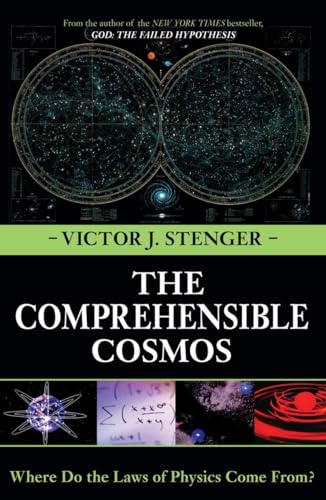The Comprehensible Cosmos: Where Do the Laws of Physics Come From?
Stenger, Victor J.
About the Book
Description:
Connecting readers with great books since 1972! Used textbooks may not include companion materials such as access codes, etc. May have some wear or writing/highlighting. We ship orders daily and Customer Service is our top priority!. Seller Inventory # S_384663813
About this title:
Synopsis: For those fascinated by how physics explains the universe and affects philosophy, this in-depth presentation of the cosmos, complete with an appendix of mathematical formulas, makes accessible to lay readers findings normally available only to professional scientists. In a series of remarkable developments in the 20th century and continuing into the 21st, elementary particle physicists, astronomers, and cosmologists have removed much of the mystery that surrounds our understanding of the physical universe. We now have mathematical models that are consistent with all observational data, including measurements of incredible precision, and we have a good understanding of why those models take the form they do. But the question arises: Where do the "laws" revealed by the mathematical models come from? Some conjecture that they represent a set of restraints on the behavior of matter that are built into the structure of the universe, either by God or some other ubiquitous governing principle. In this challenging, stimulating discussion of physics and its implications, the author disputes this notion. Instead, he argues that physical laws are simply restrictions on the ways physicists may draw the models they use to represent the behavior of matter if they wish to do so objectively. Since mathematical descriptions of data must be independent of any specific point of view, that is, they must possess "point-of-view invariance" (maximum objectivity), they naturally conform to certain fundamental laws that insure that objectivity, such as the great conservation principles of energy and momentum. The laws of physics, however, are not simply an arbitrary set of rules since the observed data beautifully demonstrate their accuracy.
About the Author: Victor J. Stenger (1935 - 2014) was an adjunct professor of philosophy at the University of Colorado and emeritus professor of physics and astronomy at the University of Hawaii. He was the author of the New York Times bestseller God: The Failed Hypothesis, God and the Atom, God and the Folly of Faith, The Comprehensible Cosmos, and many other books.
Bibliographic Details
Title: The Comprehensible Cosmos: Where Do the Laws...
Publisher: Prometheus
Publication Date: 2006
Binding: hardcover
Condition: Good
